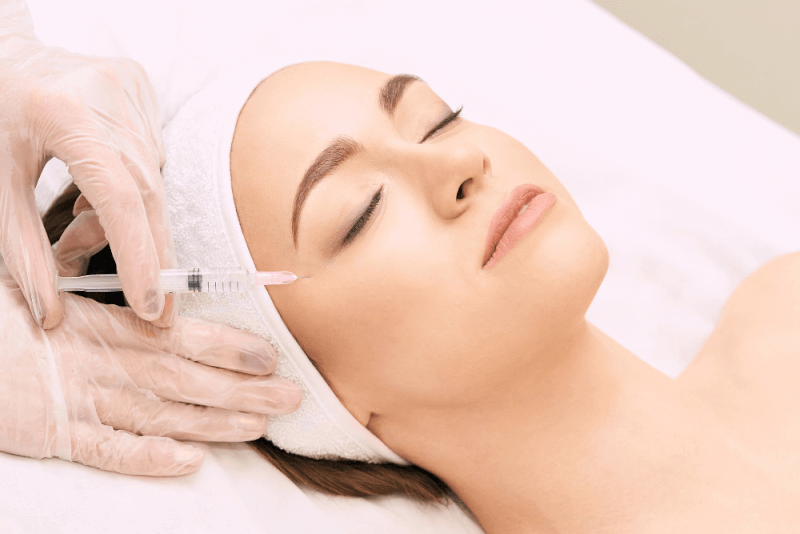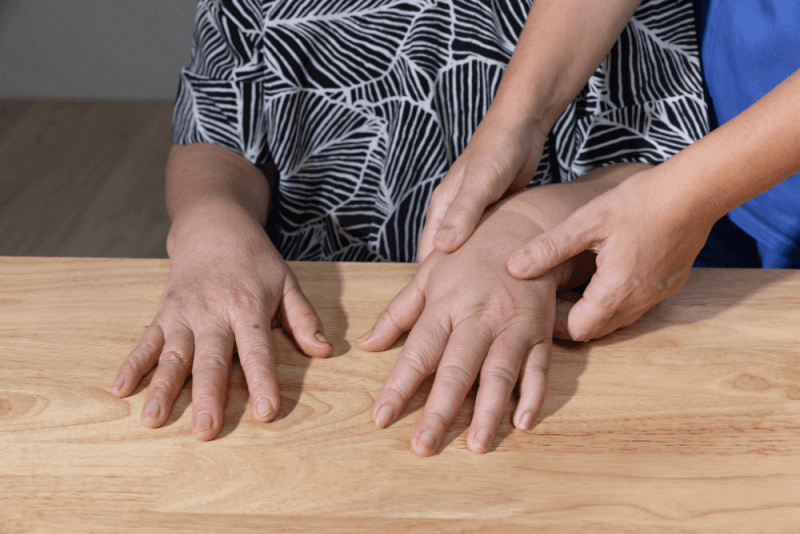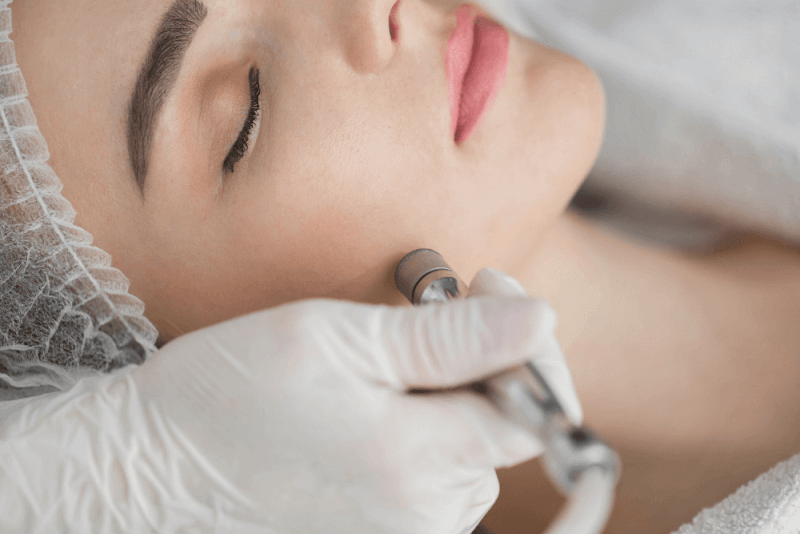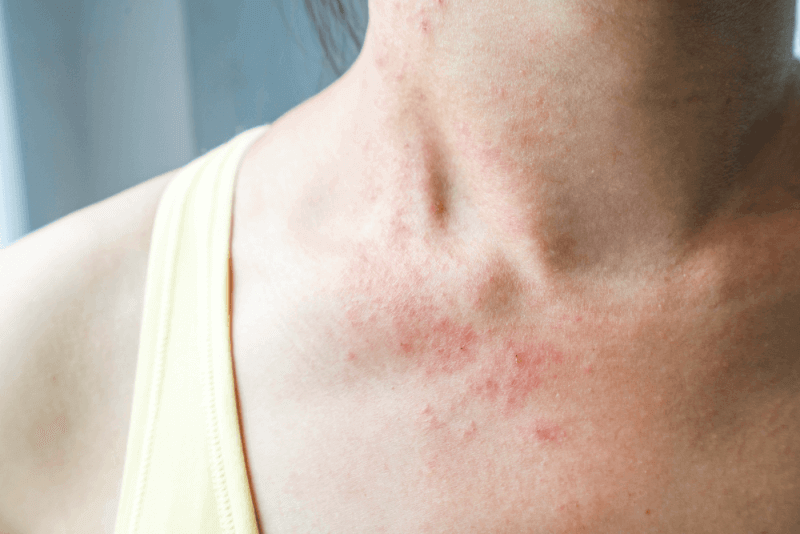What is Mesotherapy?
Developed by a French doctor in 1952, mesotherapy is a procedure that uses various vitamins, enzymes, antioxidants, and plant extracts. It is used to make the skin look younger and firmer, as well as to support hair growth on the scalp and to reduce excess fat.
Types of Mesotherapy
Mesotherapy can be applied to different parts of the body for various purposes. It is generally classified by the area of application or the purpose of treatment. Commonly applied types of mesotherapy include:
Hand Mesotherapy
The skin on the hands can be significantly affected by environmental factors and aging. Wrinkles, dryness, and spots are among the prominent issues. Hand mesotherapy can be applied to address these and other problems.
Décolletage Mesotherapy
The purposes of mesotherapy applied to the décolletage area include:
- Removal of sunspots and moles
- Skin tightening
- Reduction of wrinkles in the area
- Correction of skin discoloration
- Achieving a younger and healthier appearance
Hair Mesotherapy
Mesotherapy applied to the scalp is a method that can be used by both women and men. It is commonly used to prevent hair loss and improve hair quality. It is especially preferred by those experiencing baldness. The serum injected nourishes the hair follicles, promoting hair growth, lengthening, and improving hair quality. For this reason, it is also frequently chosen after hair transplant treatment.
By increasing blood circulation in the hair follicles, this method ensures that the follicles are better nourished. To achieve the desired results, 4-10 sessions are recommended.
Neck Mesotherapy
Mesotherapy can also be used to treat sagging, wrinkles, and other signs of aging in the neck area. By stimulating collagen production in the subcutaneous tissues, mesotherapy can make the area look tighter and fuller. Additionally, it can be used to reduce fat in the double chin area.
Pain Mesotherapy
Pain mesotherapy involves injections into the middle layer of the skin. The aim of pain mesotherapy is to improve blood circulation and treat factors causing damage. There is no single formula used in pain mesotherapy; instead, serums are prepared according to the patient's needs. Common ingredients in these serums include:
- Pain relievers
- Vasodilators
- Antibiotics
- Collagenase
- Calcitonin
- Hyaluronidase
- Thyroxine
- Vitamins and minerals
Pain mesotherapy is frequently used for the following conditions:
- Joint pain
- Joint mobility limitations
- Joint swelling
- Trigeminal neuralgia
- Pain due to connective tissue damage
- Muscle pain
- Acute and chronic tissue strains
- Some types of edema
- Migraines
- Cellulite
- Wrist pain
- Abdominal pain due to intestinal spasms
- Pain from soft tissue sports injuries
Cellulite Mesotherapy
Cellulite mesotherapy, which aims to reduce the appearance of cellulite, helps to resolve circulation problems and lymphatic drainage issues in the fat tissue. By eliminating these problems, which cause cellulite formation, the appearance of cellulite is reduced. The purposes of cellulite mesotherapy include:
- Improving blood circulation under the skin
- Promoting lymphatic drainage
- Accelerating the metabolism of fat cells
- Tightening the skin
- Reconstructing skin texture
- Reducing pain and discomfort
Facial Mesotherapy
Mesotherapy, applied to eliminate signs of aging in the face as one gets older, stands out among other methods despite not being a surgical procedure. In addition to signs of aging, it helps to resolve many different problems. These problems include:
- Dry skin
- Damaged skin barrier
- Spots
- Acne
- Scar marks
- Comedones
Localized Fat Reduction
Also known as injection lipolysis, this type of mesotherapy is used to achieve localized slimming. Certain ingredients known for their fat-burning effects are used in these mesotherapy treatments. These ingredients include:
- Bile acid
- Caffeine
- Soy lecithin
- Carnitine
Mesotherapy for localized slimming is usually applied to the arms, legs, waist, and abdomen. Supporting mesotherapy for localized slimming with diet and exercise helps to achieve the desired results.
Needle-Free Mesotherapy
In needle-free mesotherapy applications, serums are transferred to the skin without the use of injections. This prevents any redness, bruising, or swelling in the treatment area. Special devices are used for the transfer of serums. These devices use electromagnetic pulses or ultrasonic waves to deliver active ingredients to the lower layers of the skin, known as the dermis.
How is Mesotherapy Applied?
Mesotherapy is a procedure applied with very fine needles. Depending on the area and the problem, the injection process can be applied to the dermal layer of the skin or to the fat tissue. The combination of substances to be injected is specially prepared according to the area and the problem. This mixture includes vitamins, enzymes, nutrients, hormones, vasodilators, anti-inflammatory agents, beta-receptor agonists, and antibiotics.
In cellulite treatment, the most commonly used substances for reducing body fat are lecithin and isoproterenol. Lecithin is a compound found in human bile, necessary for the digestion of dietary fats. Isoproterenol is a lipolytic agent that initiates a chemical reaction in the body to break down fat cells.
Mesotherapy applications are generally performed every 2 weeks. To achieve the necessary benefits from the method, 3 to 15 sessions are recommended.
What is Mesotherapy Used For?
Mesotherapy is a method that can be used on various parts of the body for many different purposes. Due to the wide variety of active ingredients in the serums used, its application area is extremely broad, and new uses are being discovered every day. The most common areas of use for mesotherapy include:
- Reducing signs of aging on the skin
- Spot treatment
- Stretch marks
- Cellulite
- Localized slimming
- Hair loss
- Nourishing the hair
- Dark circles under the eyes
- Reducing under-eye bags
- Allergies
- Acute or chronic pain
- Sports injuries
- Fibromyalgia
- Vitiligo
What are the Benefits of Mesotherapy?
Mesotherapy is generally known for its skin applications. It provides results beyond expectations in improving dull, tired, and dehydrated skin. In addition, the benefits of mesotherapy include:
- Instant improvement of wrinkles
- More efficient blood circulation
- Elimination of toxins accumulated due to aging
- Acne treatment
- Increased collagen production
- Delaying the signs of aging
- Repairing the skin
- Healing muscle injuries
- Reducing inflammation
- Relieving menstrual pain
- Addressing localized weight issues
- Reducing hair loss
- Alleviating chronic pain
- Treating bone and joint disorders
- Treating psoriasis
- Reducing cellulite
What Should Be Considered After Mesotherapy?
The points to be considered after mesotherapy vary depending on the area where the procedure is applied. If mesotherapy is applied to the face, the following precautions should be taken:
- Do not wash your hair on the day of the application.
- It is recommended not to dye your hair for a while after the application.
If mesotherapy is applied to the hair, the following precautions should be taken:
- Do not wash your face on the day of the application.
- Do not apply makeup for 24 hours after the procedure.
- Do not use any products other than the recommended ones.
If mesotherapy is applied to the body, the following precautions should be taken after the procedure:
- Do not take a shower or use a sauna or bath on the day of the procedure.
- Do not scratch the treated area.
- Do not apply pressure or massage to the treated area. Do not rub the treated area.
- Avoid strenuous exercise after the procedure.
- Do not wear tight clothing on the day of the procedure.
What Are the Side Effects of Mesotherapy?
Since mesotherapy is applied directly to the problem area, side effects are limited to the treatment area. Known side effects of mesotherapy include:
- Immediate or delayed allergic reactions to the injected drugs
- Lecithin may cause inflammation or swelling.
- Skin infections
- Pigmentation at the injection site
- Bruising at the injection site
- Ulceration, scarring, and deformity at the injection site
- Panniculitis
When mesotherapy is applied for localized slimming, it is not yet fully understood what happens to the broken fat cells after they leave the targeted area or what side effects the various injected substances have on the body's organs and tissues. Therefore, more research is needed in the field of localized fat reduction through mesotherapy.
When Should Mesotherapy Not Be Applied?
It is not recommended to apply mesotherapy in the following situations:
- Pregnancy
- Breastfeeding
- In individuals who have had a stroke
- In insulin-dependent diabetics
- In cancer patients
- In individuals with heart disease requiring multiple medications
- In individuals with blood clotting disorders
- In individuals allergic to any of the ingredients to be used
- In individuals with urticaria








